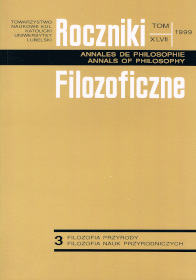Idee pola racjonalności w filozofii procesu Alfreda Northa Whiteheada
Abstrakt
The article introduced below, is apart of adoctor's thesis prepared during the seminar philosophy of nature at Catholic University in Lublin. The subject of the thesis is the conception of the „rationale field”.
Although J.Życiński is considered to be the author of the conception of the rationale field, his main ideas are also present in the works of other scholars as, for example A.North Whitehead philosophy of process.
There are two arguments presented in the article. The main thesis states the ideas of the rationale field (also called the rationale matrix of the world) are directly connected with A.N.Whitehead participates in the world, but also his interests, education and spiritual culture.
According to two the main Whitehead works: Process and Reality: An Essay in Cosmology and more popular Science and the Modern World the author's aim was to prove that the ideas of the rationale field, even though not verbalized, were present in Whitehead philosophysince the very beginning.
Moreover, the author of the article pointed to the possible mathematical interpretation ofthe process philosophy and gave some examples of its particularly clear usage.
Bibliografia
Gutowski P., Filozofia procesu i jej metafilozofia. Studium metafizyki Ch.Hartshorne'a, Lublin 1995.
Heller M., Czas i matematyka – przyczynek do zrozumienia struktury procesu, [w:] Bóg i przyroda w filozofii procesu, (Znak – Idee, 5), pod red. bpa J.Życińskiego, Kraków 1992, s. 76-87.
Whitehead A.N., Bóg iświat, [w:]Bóg i przyroda w filozofii procesu, s. 31-43.
Whitehead A.N., Cel filozofii, (Zagadnienia filozoficzne w nauce, XI), Kraków 1989.
Whitehead A.N., Process and Reality: An Essay in Cosmology, New York 1929.
Whitehead A.N., Science and the Modern World, New York 1925 (tł. pol. S. Magala, Nauka i świat współczesny, Warszawa 1988).
Życiński J., Teizm i filozofia analityczna, t.I, Kraków 1985; t.II, Kraków 1988.
Życiński J., Wprowadzenie, [w:] Bóg i przyroda w filozofii procesu, s.3-5.
Copyright (c) 1999 Roczniki Filozoficzne

Utwór dostępny jest na licencji Creative Commons Uznanie autorstwa – Użycie niekomercyjne – Bez utworów zależnych 4.0 Międzynarodowe.





